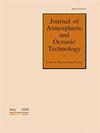A Neural Network-based Cloud Mask for PREFIRE and Evaluation with Simulated Observations
IF 1.9
4区 地球科学
Q2 ENGINEERING, OCEAN
引用次数: 1
Abstract
The Polar Radiant Energy in the Far InfraRed Experiment (PREFIRE) will fill a gap in our understanding of polar processes and the polar climate by offering widespread, spectrally-resolved measurements through the Far InfraRed (FIR) with two identical CubeSat spacecraft. While the polar regions are typically difficult for skillful cloud identification due to cold surface temperatures, the reflection by bright surfaces, and frequent temperature inversions, the inclusion of the FIR may offer increased spectral sensitivity, allowing for the detection of even thin ice clouds. This study assesses the potential skill, as well as limitations, of a neural network-based cloud mask using simulated spectra mimicking what the PREFIRE mission will capture. Analysis focuses on the polar regions. Clouds are found to be detected approximately 90% of time using the derived neural network. The NN’s assigned confidence for whether a scene is ‘clear’ or ‘cloudy’ proves to be a skillful way in which quality flags can be attached to predictions. Clouds with higher cloud top heights are typically more easily detected. Low-altitude clouds over polar surfaces, which are the most difficult for the NN to detect, are still detected over 80% of the time. The FIR portion of the spectrum is found to increase the detection of clear scenes and increase mid-to-high altitude cloud detection. Cloud detection skill improves through the use of the overlapping fields of view produced by the PREFIRE instrument’s sampling strategy. Overlapping fields of view increase accuracy relative to the baseline NN while simultaneously predicting on a sub-FOV scale.基于神经网络的预燃云掩模及模拟观测评估
远红外实验中的极地辐射能(PREFIRE)将通过两个相同的立方体卫星航天器通过远红外(FIR)提供广泛的光谱分辨测量,填补我们对极地过程和极地气候理解的空白。由于寒冷的表面温度、明亮表面的反射和频繁的温度反演,极地通常很难进行熟练的云识别,但FIR的加入可以提高光谱灵敏度,甚至可以探测到薄冰云。这项研究使用模拟PREFIRE任务将捕获的模拟光谱,评估了基于神经网络的云罩的潜在技能和局限性。分析的重点是极地地区。使用衍生的神经网络,大约90%的时间都可以检测到云。NN对场景是“晴朗”还是“多云”的置信度被证明是一种将质量标志附加到预测中的巧妙方法。云顶高度较高的云通常更容易被探测到。极地表面的低空云是神经网络最难探测到的,但仍有80%的时间被探测到。发现频谱的FIR部分增加了对清晰场景的检测,并增加了中高空云的检测。通过使用PREFIRE仪器的采样策略产生的重叠视场,云检测技能得到了提高。重叠的视场增加了相对于基线NN的精度,同时在亚FOV尺度上进行预测。
本文章由计算机程序翻译,如有差异,请以英文原文为准。
求助全文
约1分钟内获得全文
求助全文
来源期刊
CiteScore
4.50
自引率
9.10%
发文量
135
审稿时长
3 months
期刊介绍:
The Journal of Atmospheric and Oceanic Technology (JTECH) publishes research describing instrumentation and methods used in atmospheric and oceanic research, including remote sensing instruments; measurements, validation, and data analysis techniques from satellites, aircraft, balloons, and surface-based platforms; in situ instruments, measurements, and methods for data acquisition, analysis, and interpretation and assimilation in numerical models; and information systems and algorithms.

 求助内容:
求助内容: 应助结果提醒方式:
应助结果提醒方式:


